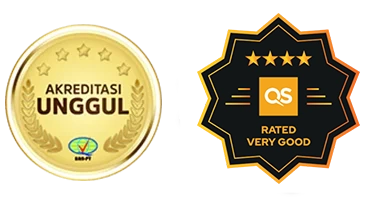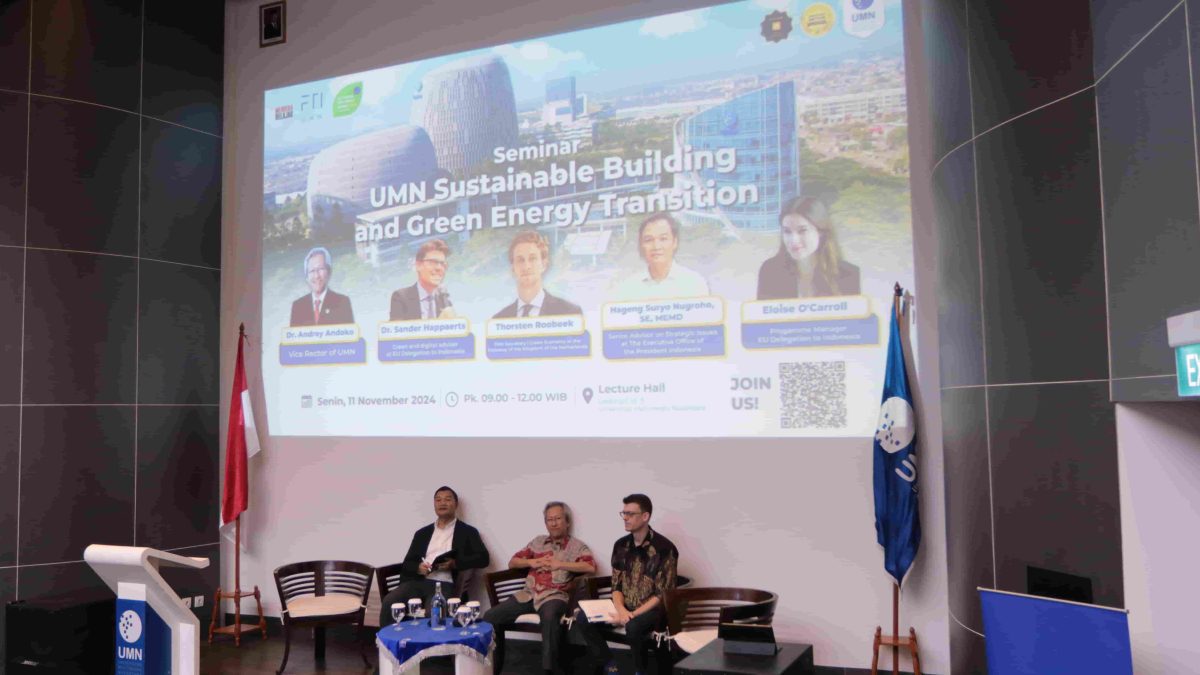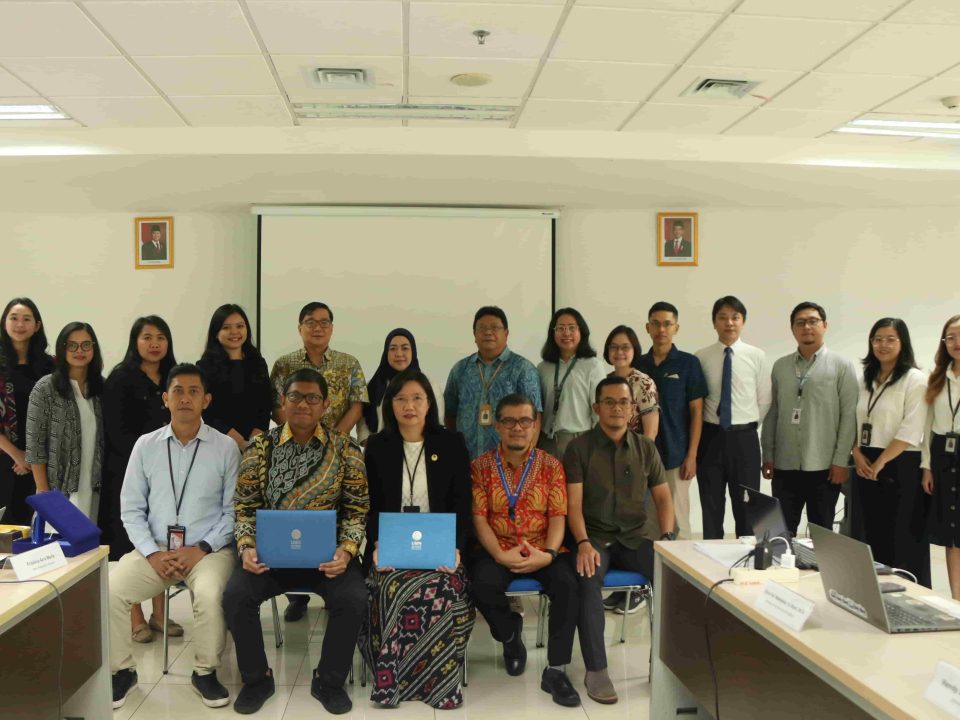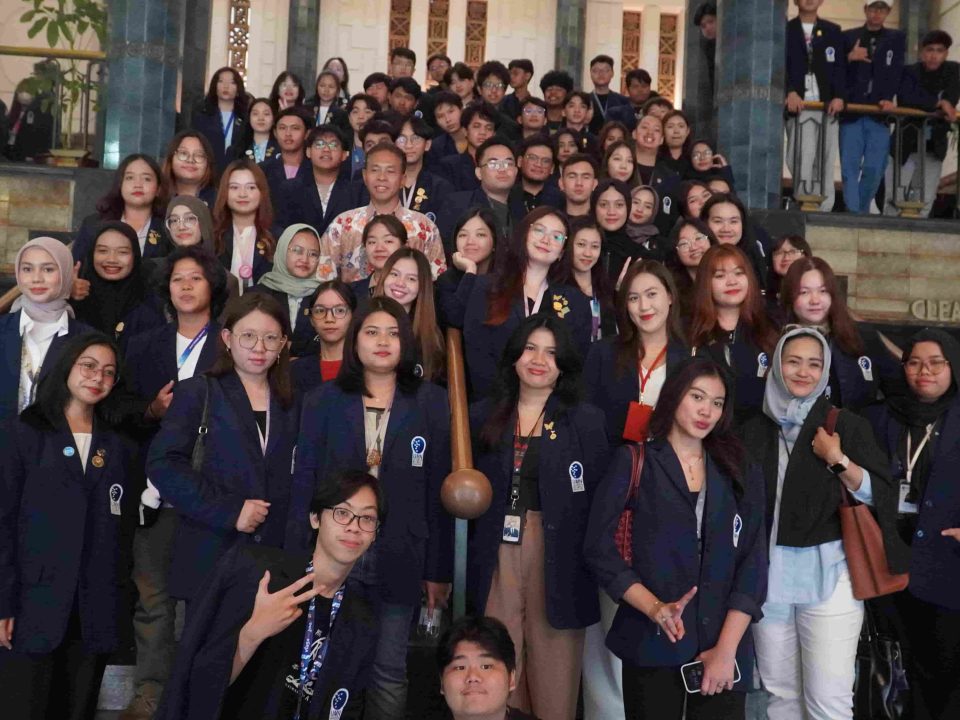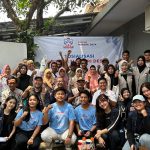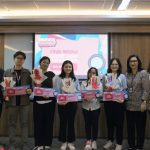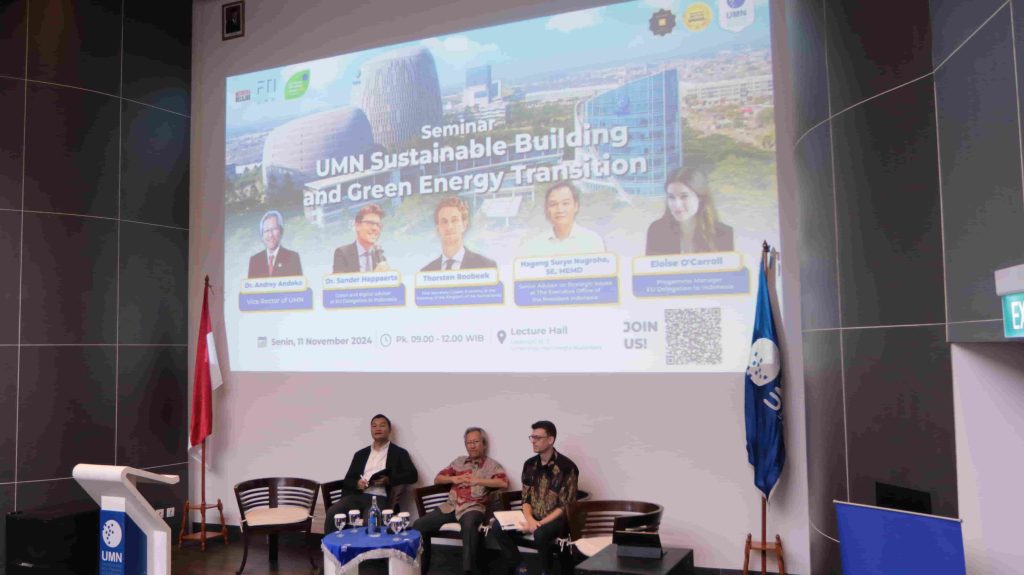
UMN Sustainable Building and Green Transitions Seminar with Andrey, Sanders, and Hageng. (Doc. UMN)
Tangerang – On (11/11/24) UMN organized a Sustainable Building and Green Energy transition seminar. Together with the European Delegations, this seminar aimed to emphasize the importance of sustainable energy. In addition to the seminar, this meeting also discussed climate action with students.
Sustainable building and green energy are important issues for global sustainability. Sustainable building refers to environmentally friendly and green buildings with three main pillars: social, economic, and environmental. The concept also involves the application of sustainable energy, utilizing renewable energy in the building process.
Dr. Ir. Andrey Andoko, M.Sc., had the opportunity to provide material about green building in UMN, starting from UMN building design, water management, waste, and how UMN continues to be committed to reducing energy reduction.
“We make UMN’s campus environmentally friendly, and we want to emphasize ‘every space is a learning space.’ Students do not only learn in classrooms or libraries. At UMN, many students study in UMN’s outdoor areas,” Andrey said.
Andrey also explained UMN’s passive and active design, which uses east and west building orientations. In addition, UMN uses double-skin facades. Besides simplicity, double-skin facades can reduce hot air by 70%.
“Apart from buildings, other things such as rainwater are reused for plants, so the water returns to the ground. Food waste, organic waste, and tree waste are also utilized to make eco enzymes,” Andrey continued.
UMN is also aware of the importance of SDGs, and many of its programs focus on all aspects of sustainability. UMN does this through various programs such as community outreach, gender equality, which involves men and women in all activities, and research that can help sustainability.
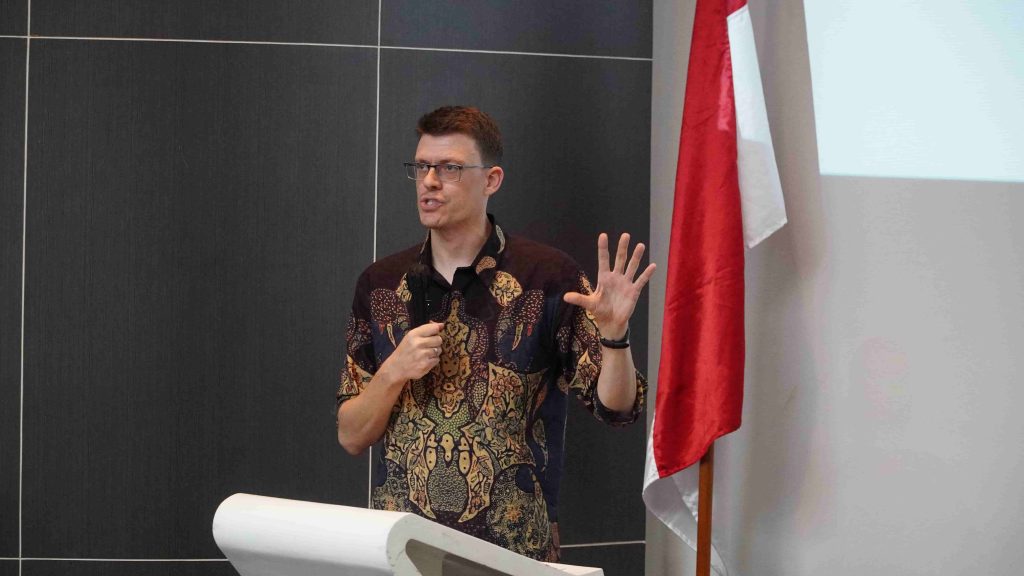
Dr. Sanders delivering his material in the seminar (Dok. UMN)
Dr. Sanders Happaerts, the Green and Digital Adviser at EU Delegations to Indonesia, continued the presentation by discussing energy emissions in Europe. Europe has reduced emissions by 55% and increased economic GDP from various sectors.
“We created the EU Emissions Trading System so the total emissions in certain business sectors are limited, and there must be permission to trade emissions and buy more greenhouse gases, called cap and trade,” Sanders said.
Through this system, more and more companies are reducing gas emissions. In the future, this regulation will also be applied to building and transportation companies. Other programs carried out by European delegations include the European Green Deal, which includes Greener Industry, Financing Green Projects, Energy Efficient Homes, From Farm to Fork, and many more.
“We have been doing Energy Union Strategy since 2015, including energy efficiency, a fully integrated energy market, research, innovation & competitiveness, and many more. This is so that all halls can be connected to each other, and markets in Europe can share energy together. We also focus on research and innovation by giving more money to universities so they can make new and innovative things,” Sanders continued.
Sanders proves this through the current war in Ukraine. European governments are providing all kinds of assistance– military, energy, and renewable energy. These are national issues that make countries in Europe work together.
“The biggest challenge for Europe today is to make renewable energy; we continue to make renewable energy. In the future, we will continue to focus on this and green diplomacy. We will continue cooperating with countries because this is quite important for us,” Sanders concluded.
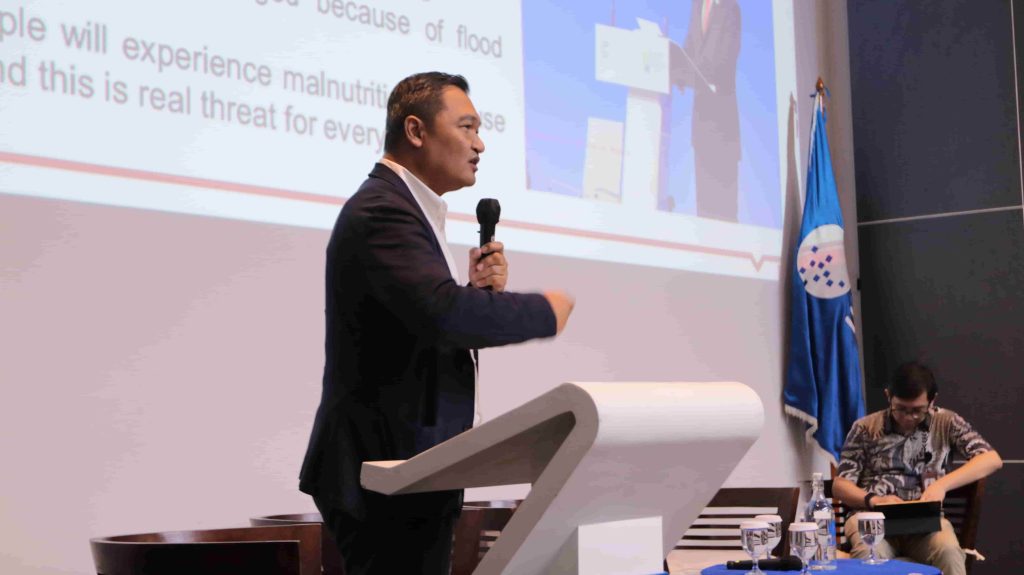
Hageng, in the presentation of NRE material in Indonesia (Doc. UMN)
Hageng Suryo Nugroho, SE, MEMD, Senior Advisor on Strategic Issues at the Executive Office of the President of Indonesia, continued the seminar. Hageng also gave his material on Sustainable Energy in Indonesia. Given the amount of green energy in Indonesia, this is a good opportunity for Indonesia to develop New Renewable Energy (NRE).
“We are targeting this NRE in 2050 and have seen the growth rate from 201. We are very committed to the sustainability of NRE. The biggest NRE potential in Indonesia is Solar,” Hageng said.
Hageng also said that in 2060, Indonesia wants to achieve a Net Zero Emission (NZE) of 93%. Several strategies have been implemented, including Demand Sector Electrification, NRE Development, New Energy Resources, and many more.
“Currently, we are focusing on electric vehicle (EV) regulations as Indonesia has plenty of energy for transportation, and the government must provide subsidies. The EV regulation is expected to reduce the use of diesel. In addition to using EVs, we encourage people to use induction cookers to reduce CO2,” Hageng continued.
Hagen shared that achieving this will be challenging for Indonesia. There are several challenges to achieving a green energy transition. First, not all people in Indonesia have access to environmentally friendly energy; more income is needed, and a more efficient role of science and technology is necessary.
Discussion Panel with Students
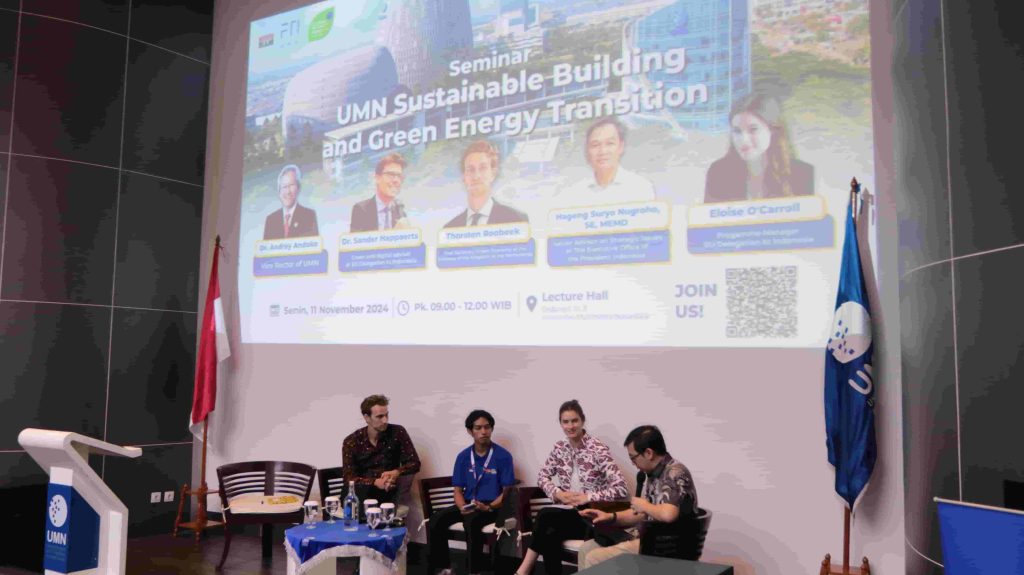
Throsten and Eloise in the Discussion Panel (Doc. UMN)
Eloise O’Carool, Program Manager of EU Delegations to Indonesia, and Thorsten Roobeek, first Secretary of Green Economy at the Embassy of the Kingdom of the Netherlands, led the discussion.
“I think the most urgent thing right now is climate action, and the young generation has a very important role for the future. We have to know what we are doing and what the impact will be for us in the future. Starting from ourselves, what we can do for ourselves, what we can do for our country, and then what we can do for the world,” Thorsten said.
Eloise also said the same thing about climate action. She argued that every country has its way of solving this problem.
“As long as we work with Indonesia, we will be very supportive of the programs carried out by Indonesia, such as the G20, which is a good step in accelerating the growth of renewable energy. We will certainly support things like this so that no one is left behind,” said Eloise.
Thorsten also continued this discussion and saw how the Netherlands made many mistakes. To avoid making the same mistakes, Europe helped other countries do the right thing.
Thorsten and Eloise also gave tips for young people to keep learning and updating their skills. The most important skills are communication and crisis thinking.
By Rachel Tiffany Tanukusuma | UMN News Service
English translation by Levina Chrestella Theodora
Kuliah di Jakarta untuk jurusan program studi Informatika| Sistem Informasi | Teknik Komputer | Teknik Elektro | Teknik Fisika | Akuntansi | Manajemen| Komunikasi Strategis | Jurnalistik | Desain Komunikasi Visual | Film dan Animasi | Arsitektur | D3 Perhotelan , di Universitas Multimedia Nusantara. www.umn.ac.id

